
Journal Menu
► ▼ Journal Menu-
- Vaccines Home
- Aims & Scope
- Editorial Board
- Reviewer Board
- Topical Advisory Panel
- Instructions for Authors
- Special Issues
- Topics
- Sections & Collections
- Article Processing Charge
- Indexing & Archiving
- Editor’s Choice Articles
- Most Cited & Viewed
- Journal Statistics
- Journal History
- Journal Awards
- Society Collaborations
- Conferences
- Editorial Office
Journal Browser
► ▼ Journal BrowserNeed Help?
Announcements
4 October 2024
MDPI INSIGHTS: The CEO's Letter #16 - UNGA79 Science Summit, OASPA, Peer Review Week

Welcome to the MDPI Insights: The CEO's Letter.
In these monthly letters, I will showcase two key aspects of our work at MDPI: our commitment to empowering researchers and our determination to facilitating open scientific exchange.
Opening Thoughts

MDPI Joins the Science Summit at UNGA79 (23–27 September 2024, New York)
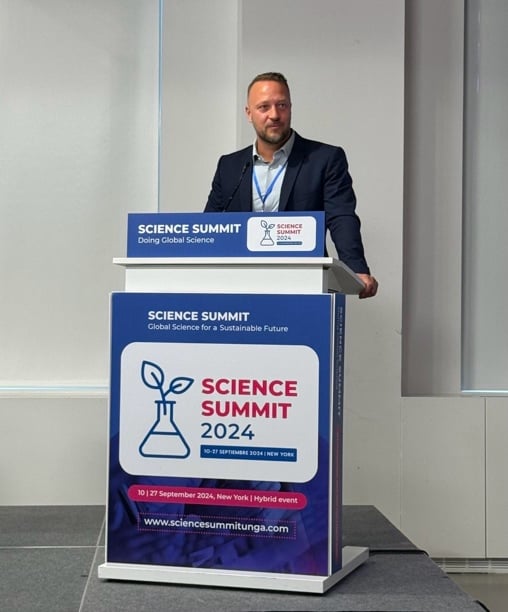
On Friday 27 September, I had the privilege of giving the opening talk at the “Youth at the Science Summit” panel during the Science Summit conference, held in New York at the 79th session of the United Nations General Assembly (UNGA). Together, we discussed the future of science, publishing, innovation, and sustainable development.
It was a great opportunity to learn from our young leaders, whose voices must be included in the conversation as science shapes the future of artificial intelligence, climate mitigation, healthcare, technology, and more. This was also a powerful reminder of how essential global collaboration is in solving the major challenges we face. I left inspired by the dedication of these young researchers to making the world a better place!
Today’s youth are not just the leaders of tomorrow – they are already leading the change today.
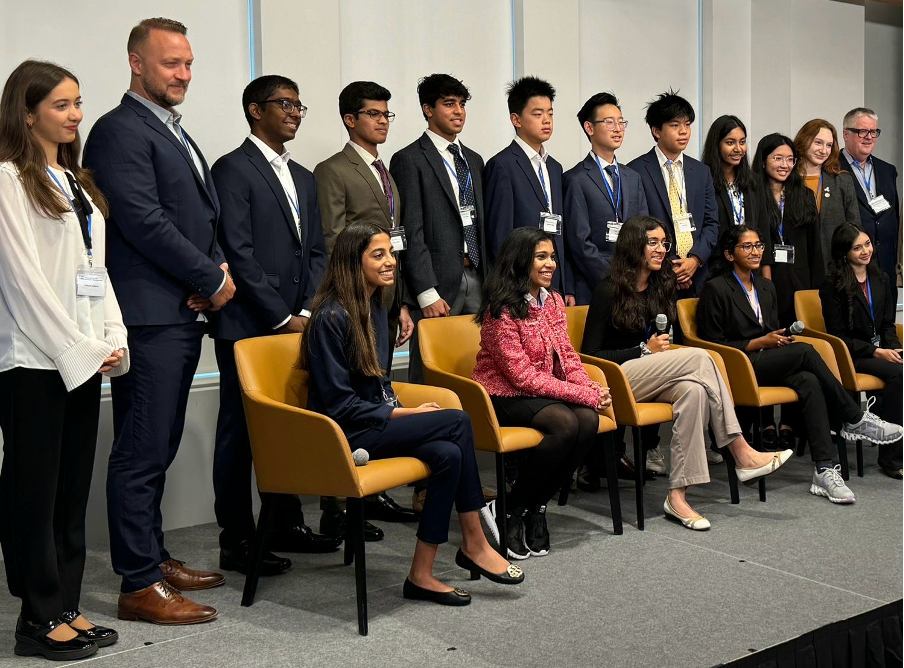
Stefan Tochev (second from left) at the UNGA Science Summit 2024: “A great opportunity to learn from our young leaders.”
MDPI Supports the Future Generation of Scientists
This aligns with MDPI’s mission to support the next generation of scientists and early-career researchers by recognizing their achievements through our various MDPI awards, including the Young Investigator Awards, Best PhD Thesis Awards, Travel Awards, and more.
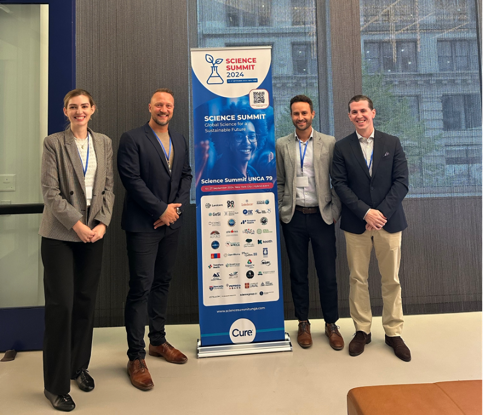
Our presence at this global event showed our commitment to advancing Open Science as a key driver for sustainable development. As a leading Open Access (OA) publisher, MDPI’s role at the summit was to emphasize the critical importance of democratizing scientific knowledge, making it accessible to all, and promoting global collaboration.
Through OA publishing, we aim to address pressing global challenges such as climate change, public health, and inequality, in line with the United Nations Sustainable Development Goals (SDGs).
“We aim to address pressing global challenges”
MDPI and the SDGs
In 2020, the SDG Publishers Compact was launched to accelerate implementation of the SDGs by promoting content that informs, develops, and inspires action. MDPI joined this initiative in 2021 and subsequently launched the MDPI SDG Hub in 2022, offering free access to recent research within the scope of each of the 17 SDGs.
During the summit, we highlighted the connection between Open Science and the SDG Publishers Compact, supporting the core objective to “Leave No One Behind” (LNOB). The transformative promise of the SDGs relies heavily on the Open Access model, which serves as a fundamental enabler of Open Science. We advocate for the wider adoption of Open Science practices in order to achieve the SDGs by 2030.
Impactful Research
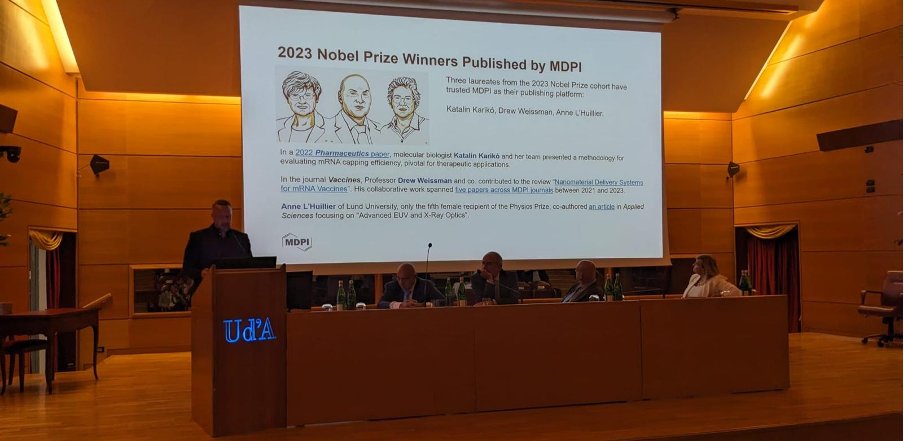
Presenting at the 1st International Conference of Environmental Medicine
In September, MDPI and our journals IJERPH and Diseases sponsored and participated in the 1st International Conference of Environmental Medicine: Environmental Threats to Human Health: From Genetics to Epigenetics, held in Chieti, Italy.
The conference was organized in collaboration with various societies, including the Italian Society of Environmental Medicine (SIMA), one of more than 160 societies partnering MDPI journals.
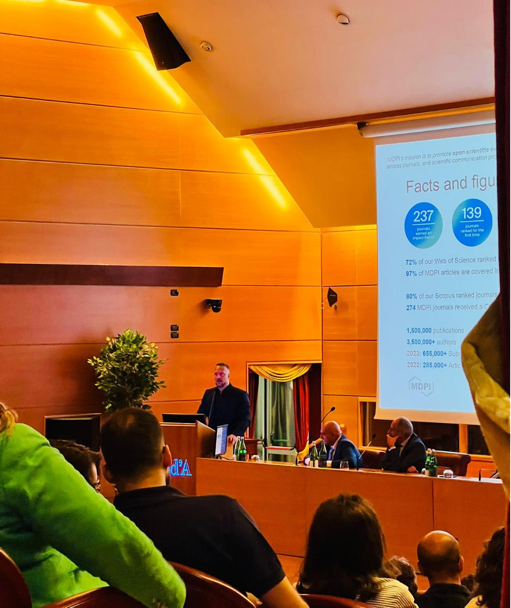
The conference brought together influential figures from the Italian scholarly community, such as Antonio Felice Uricchio (President of the National Agency for University Research Assessment [ANVUR]), Alessandro Miani (President of SIMA), and Liborio Stuppia (Director of ‘Gabriele d’Annunzio’ University of Chieti-Pescara), among others.
MDPI was the sole publishing sponsor of the conference, at which I had the opportunity to present on behalf of the company. I provided an overview of MDPI, covering key facts and figures, the peer-review process, our strong collaboration with the Italian market, and insights into Nobel Prize winners who have published with MDPI, ahead of Sir Richard Roberts’ Nobel lecture.
“As at September 2024, 44 Nobel laureates have contributed to over 115 articles across 35 MDPI journals”

The keynote speaker at the event was Sir Richard Roberts, Nobel Laureate and 1993 Nobel Prize winner in Medicine, recognized for his discovery of split genes.
Nobel Laureates’ Contributions to MDPI
As at September 2024, 44 Nobel laureates have contributed to over 115 articles across 35 MDPI journals. I’ll share more details on this in the October newsletter.
Hosting such prominent figures in their respective fields, who play a significant role in advancing the OA movement, of which we are leaders in, resonates deeply with our editorial teams.
Sponsoring and supporting academic conferences is something we do on a large scale, and it continues to grow. Attending and speaking about MDPI shows our commitment by taking the time to connect with the scholarly community in person.
MDPI’s Presence in Italy
Italy ranks third globally in total MDPI publications, with nearly 130,000 contributions. We collaborate with about 12,000 Editorial Board Members in Italy, over 6,100 of whom have an H-index of more than 25.
We have 83 Editors-in-Chief and 209 Section Editors-in-Chief from Italy. We also support 20 Italian universities through our Institutional Open Access Program (IOAP) agreements with major institutions such as Sapienza University of Rome, the University of Milan, and the University of Pisa, among others.
Inside MDPI

Celebrating Peer Review Week, 23–27 September 2024
As we conclude another productive month at MDPI, I am pleased to highlight our participation in this year’s Peer Review Week (PRW), which took place from 23–27 September 2024. This global, community-driven celebration underscores the vital importance of peer review in maintaining the integrity and reliability of academic work. PRW provide a platform for institutions, publishers, and scholars to come together and reflect on the processes that uphold the quality of scholarly communication.
“We remain committed to enhancing the peer review process”
The theme for PRW 2024 was ‘Innovation and Technology in Peer Review.’ At MDPI, we were proud to contribute through various online and in-person events, including webinars from Europe, Asia-Pacific, and a roundtable discussion on innovation and technology in peer review. These events offer an opportunity to explore new tools and technologies that are shaping the future of peer review, particularly the integration of AI. As a company, we remain committed to enhancing the peer review process with innovative solutions while preserving the essential human expertise that makes it effective.
Peer Review Innovation and Technology at MDPI
Our efforts to improve peer review extend beyond the activities of this week. We also released a blog article discussing New Tools for Advancing Research Integrity and Peer Review, where we highlight two tools that MDPI has developed to support research integrity: Eureka – Reviewer Recommender and Online Proofreader. We are continually refining SuSy, our in-house submission system, to provide a seamless experience for authors and reviewers alike.
Listening to MDPI’s Authors and Reviewers
We highly value the time of our reviewers, and so do the authors who contribute to our journals. Our editorial process is bolstered by a network of dedicated reviewers, a team of over 6,000 diligent, well-trained staff members, and an in-house article submission platform designed to ensure efficient processes.
We make it a point to continually improve the experiences of both our authors and our reviewers throughout the entire editorial process, from submission to publication. This is why we regularly ask for feedback by conducting surveys. Here is what some of our respondents recently had to say about working with MDPI:
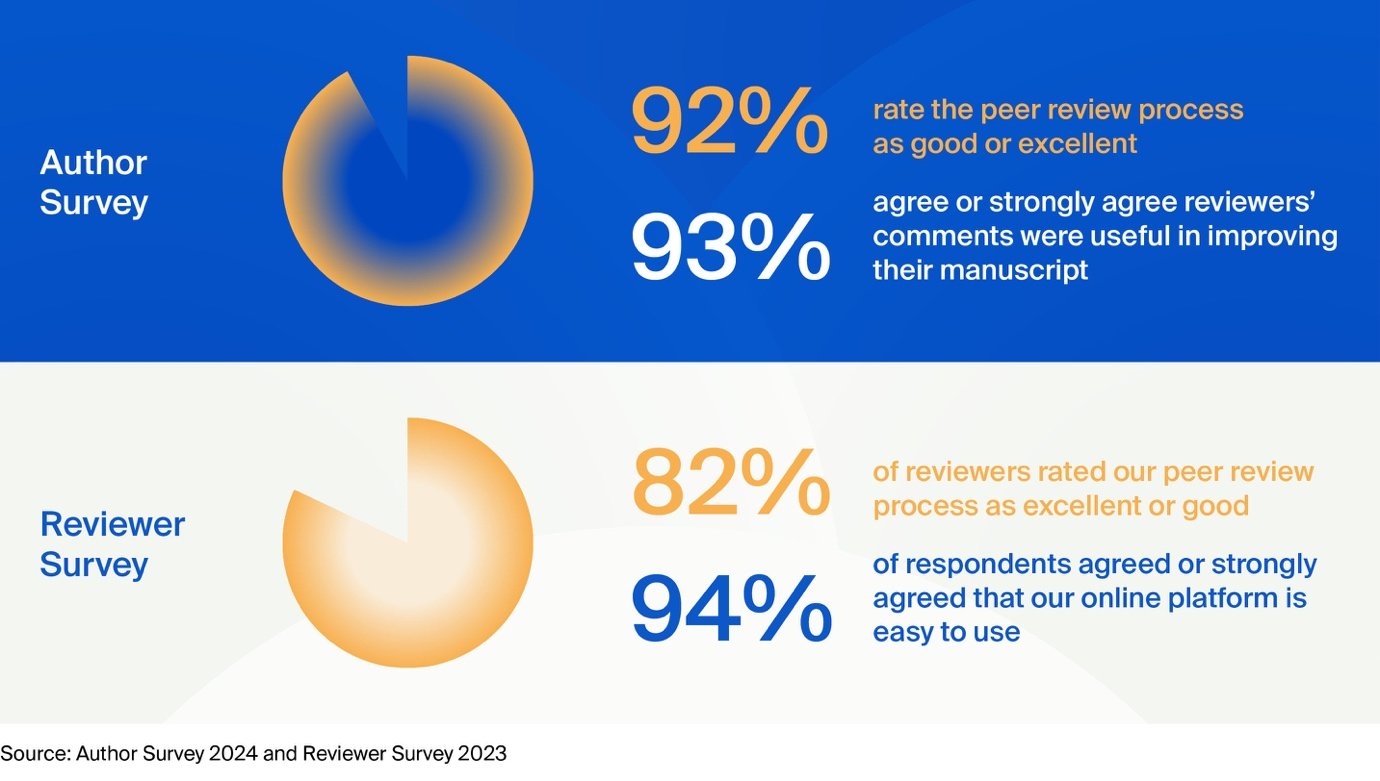
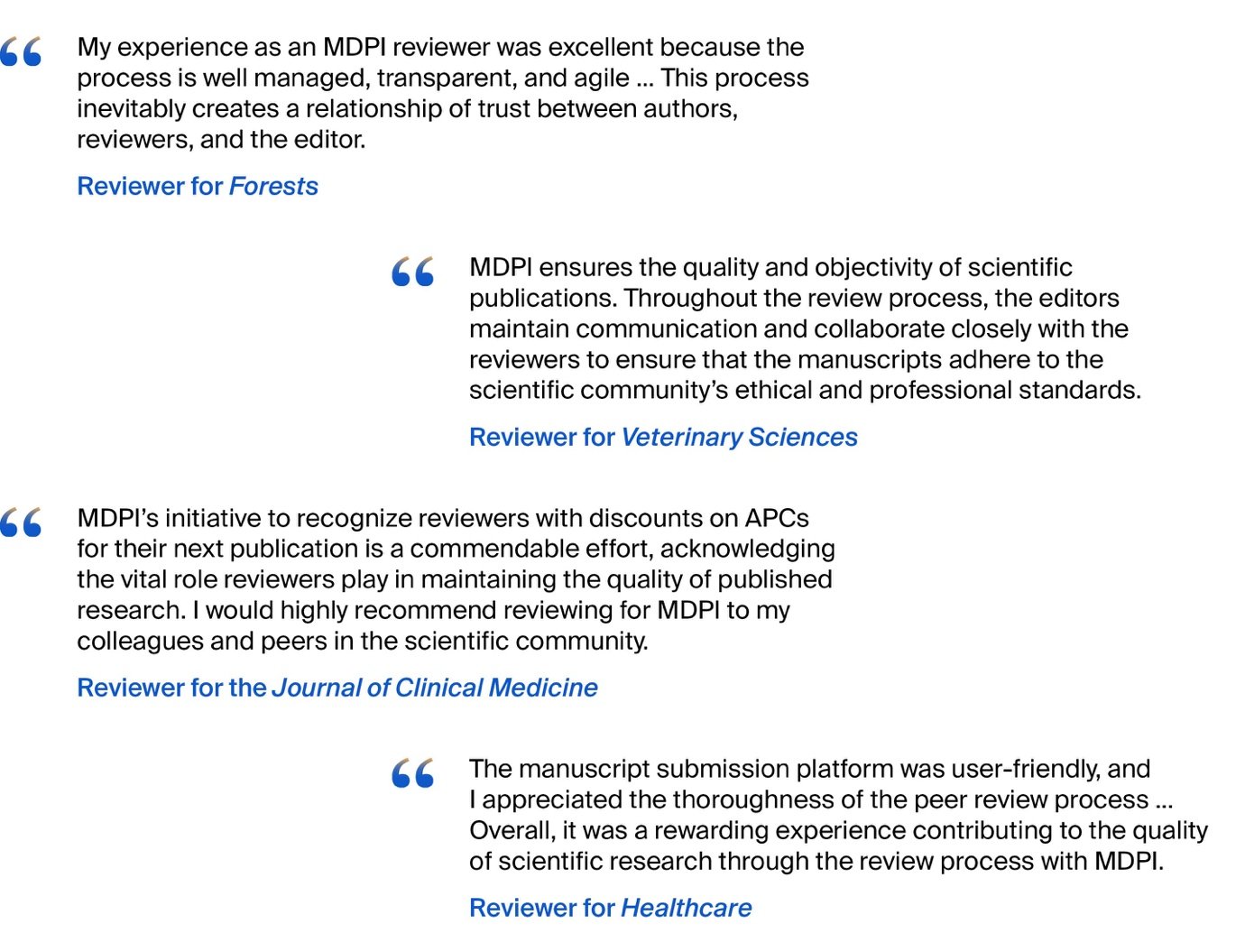
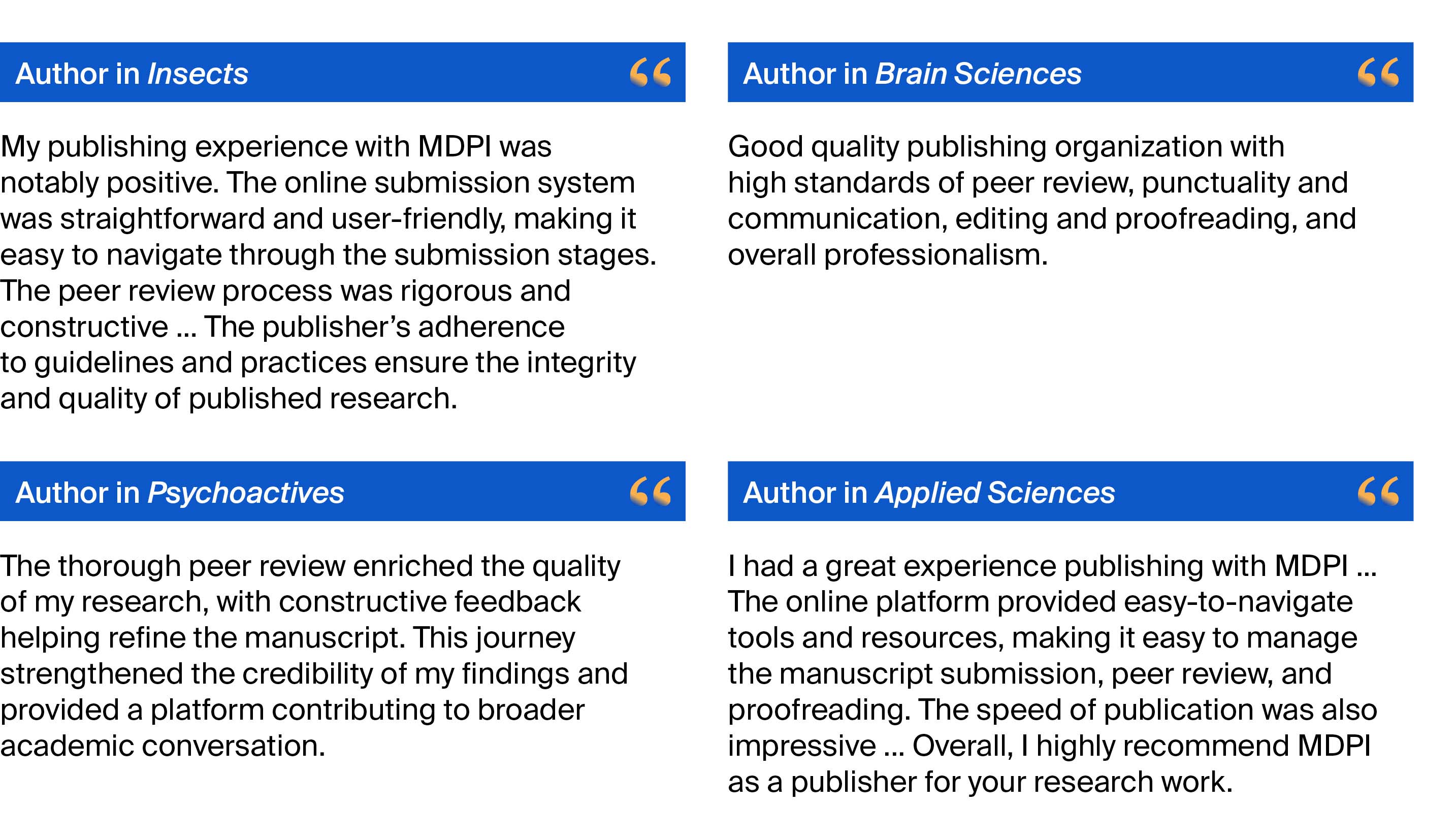
Coming Together for Science

ICM 2024 – Advances in Material Innovation
I am pleased to share that we held The 5th International Conference on Materials: Advances in Material Innovation (ICM 2024) in Basel, Switzerland this past 25–27 September.
This intimate event brought together leading scientists, researchers, and industry experts to exchange insights on recent advancements in materials characterization, processing, and manufacturing. Key focus areas included nanotechnology in material sciences and engineering, optical, electrical, and magnetic materials, soft, biological, and biomaterials, fibres, membranes, thin films, sensing materials, as well as materials and devices for energy and solar fuels. In addition, discussions featured the integration of AI and machine learning in materials research.
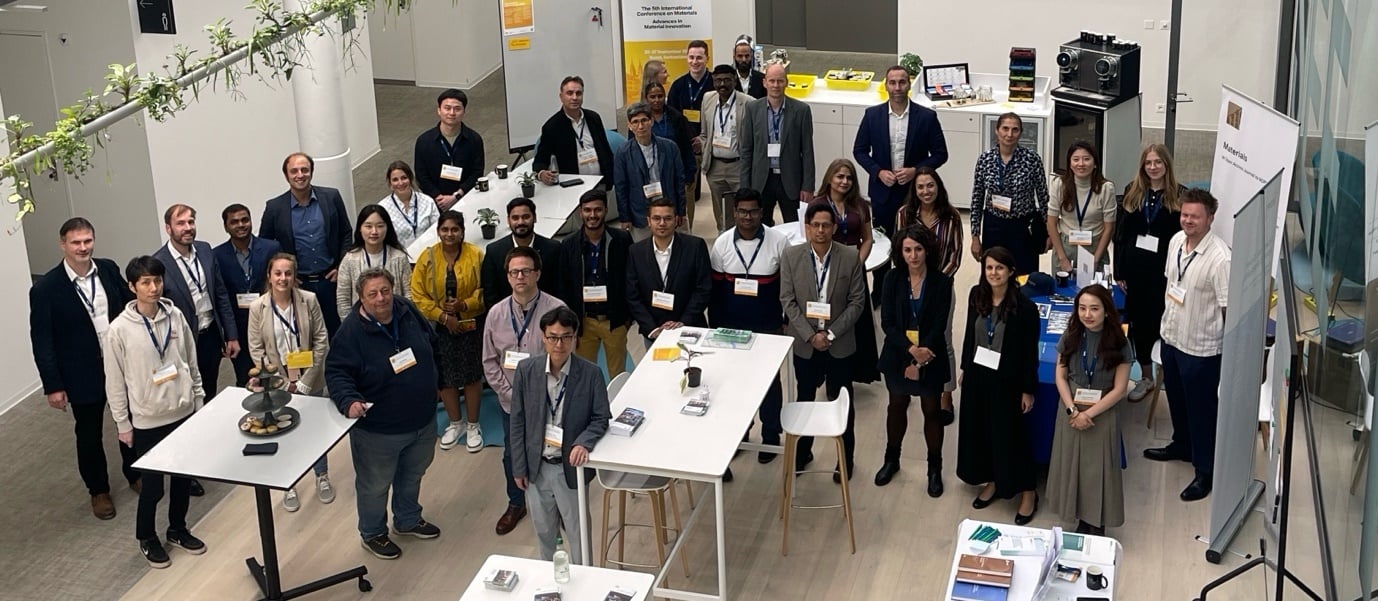
We received 90 abstract submissions. Over the course of the three-day event, 18 posters were displayed, and 34 talks were delivered, including three plenary speeches, seven invited talks, and 24 selected oral presentations.
A special thank-you to our partnering societies The Polish Membrane Society and The North American Thermal Analysis Society, as well as our sponsor, Nanomegas, for their support of the ICM conference. I am also pleased to share that we presented three awards, including the Best Presentation Award and two Best Poster Awards, recognizing the outstanding contributions of our participants.
Upcoming In-Person Event
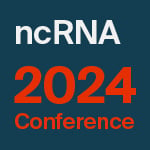
7–9 October 2024
Non-coding RNA World 2024: Exploring Mechanisms, Designing Medicines
Location: Basel, Switzerland
ncRNA 2024 will explore the latest advances in the field, covering topics from basic biology to medical and technological applications.
Find more upcoming MDPI events here.
Closing Thoughts
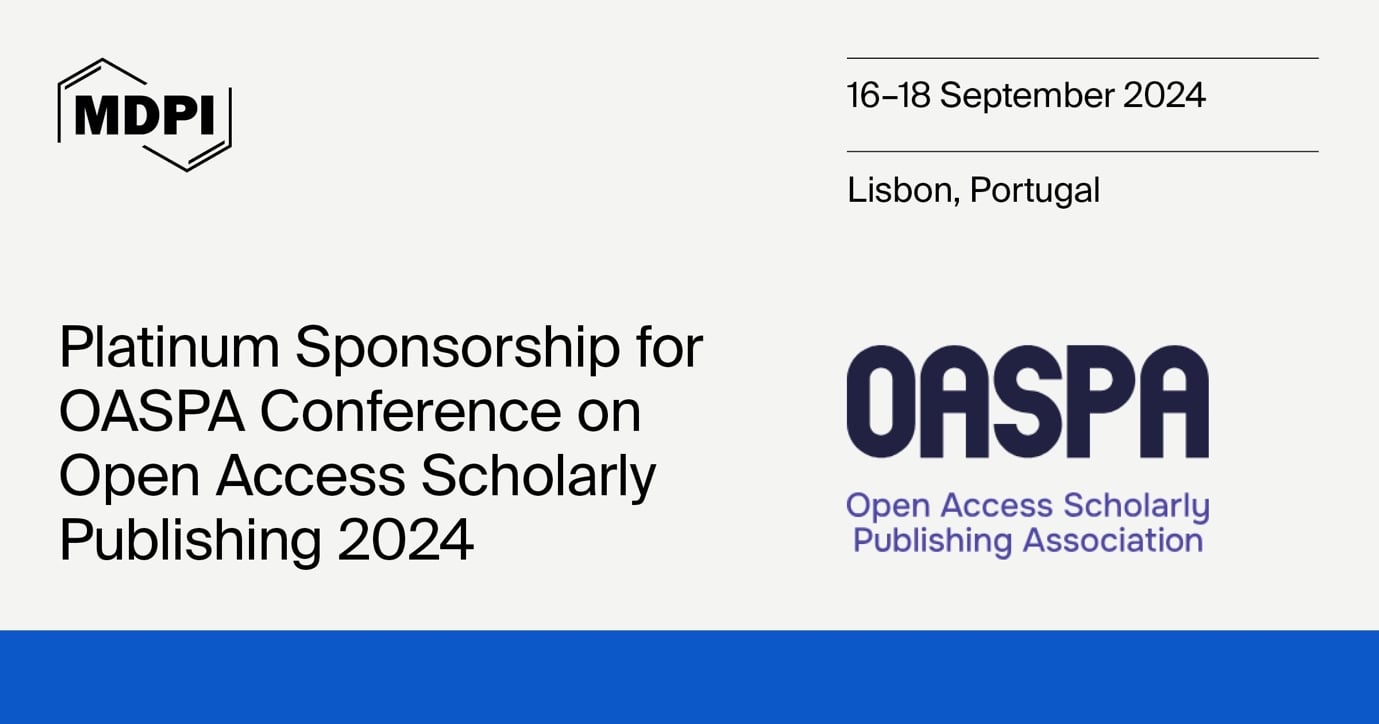
Reflections from OASPA 2024 Conference in Lisbon (16–18 September)
Amidst my September travels, I also had pleasure of attending the OASPA 2024 Conference in Lisbon from 16–18 September. It’s the first in-person Open Access Scholarly Publishing Association (OASPA) event in five years, and being in the sunny city of Lisbon made it even better! MDPI has long been a member of OASPA, and attending this conference gave us an opportunity to connect with other key members of the organization to see the latest developments in the OA movement.
“I believe that publishers have a lot to offer in terms of data and insights”
Main Themes from OASPA 2024
The main themes covered were equity and inclusivity, diamond OA, AI and openness, OA books, research integrity, and how OA can address broader societal challenges such as climate change. While it was great to see the latest developments in these areas, it was also clear that certain voices were missing, particularly those of major publishers. Although it’s not easy to incorporate every perspective, I believe that publishers, including MDPI, have a lot to offer in terms of data and insights. During the membership meeting, a few of us raised the point that large-scale publisher input could add value to these discussions.
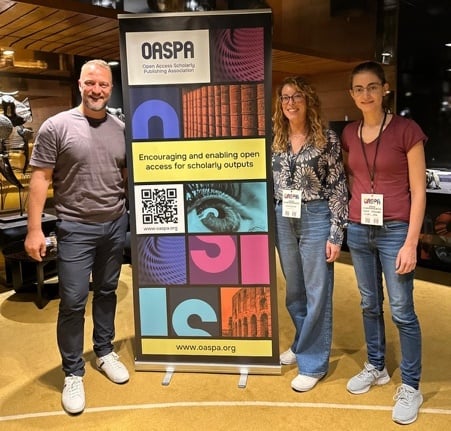
It’s important to participate in industry conferences such as OASPA in order to be part of the discussions and remain at the forefront of the OA movement.
It’s an opportunity to build meaningful relationships with organizations that share our commitment to OA.
While sponsorship is one way to show our support, it’s clear that being part of the conversation through participating in the OASPA groups and committee is what really makes a difference.
It took the last 20 years for more than 50% of the world's research to be published via open access. This provides a sobering reminder that flipping the remaining 50% will be a big challenge.
An important takeaway for me was that there is no "one-size-fits-all" solution for OA challenges: different regions and different stakeholders need different forms of support, whether it is infrastructure, funding, education, or policy, for example. I also enjoyed Rebecca Ross' presentation on how OA can drive action on climate. A few panellists shared the need for transparency in the peer-review process, advocating for open review reports, which is something we have been offering since 2014.
Speaking of openness, we are excited to celebrate Open Access Week 2024 with the scholarly community from 21–27 October. I look forward to sharing a recap of our activities in the next newsletter.
Chief Executive Officer
MDPI AG




